![]()
![]()
![]()
Use LEFT and RIGHT arrow keys to navigate between flashcards;
Use UP and DOWN arrow keys to flip the card;
H to show hint;
A reads text to speech;
43 Cards in this Set
- Front
- Back
- 3rd side (hint)
|
Fact |
Something that truly exists, or happens something that actually exists true piece of info |
Compare with opinion |
|
|
Opinion |
Belief, judgement, way of thinking about something, thinking in particular way Advice from someone with special knowledge, expert Formal statement by a judge in court, explaining the reasons a decision was made according to the rules |
Vs fact |
|
|
Disguising opinions as facts |
Weasel words Implication Hiding inconvenient facts Photos Active vs passive voice Speculation |
See separate definitions |
|
|
Weasel words |
When someone chooses language that implies fact without stating it out right Generally stating opinions to unnamed sources.... |
Sneaky words like 100% of Dr's agree... Well what kind of Dr's and who? |
|
|
Implication |
Generic phrasing suggesting that one thing linked to another Eg. Boy 13 fires shotgun in cousins face after playing gangster video game Are these two things provably linked? |
Are the 2 things linked? |
|
|
Hiding inconvenient facts |
Consider argument structure Eg. News stories tell you what they want you to think. In the beginning.. Less eye catching info at the end Ppl often lead with details that matter most to them Omit details That don't the support their version of events or opinion |
Their important argument details come 1st |
|
|
Photos |
Images are chosen to give a positive negative spin to what the author wants to convey |
Spin doctoring |
|
|
Speculation |
Forming a theory or conjecture without firm evidence Eg facts = the woman backed into the donut shop Speculation = she backed up WTO paying attention bc she was talking on the phone or singing along to some pop song bc her lips were moving |
No firm evidence |
|
|
Inference vs Assumption |
What we infer /interpret from what we observe tells a lot about our assumptions |
Man in gutter.. Needs help or is a bum? |
|
|
Bias/personal opinion |
An inclination temperament or outlook Esp. Personal and unreasoned judgement/ prejudiced Asumptions reveal biases |
The man in the gutter scenario |
|
|
RED strategy |
Recognize... Gather info... Listen... Know your assumptions... Look for gaps in logic Evaluate.... Opinions disguised as facts... Evaluate persona biases... Analyze objectively DRAW CONCLUSIONS.... Logical... Is it based on fact or personal biases... Avoid generalizing... Avoid speculation... Practice |
R= RECOGNIZE E=EVALUATE D=DRAW CONCLUSIONS |
|
|
RRA Strategy |
REFLECT= avoid snap judgements take time to think about multiple ideas and reflect on the sources of info you receive REASONS=what evidence/facts are there that support the argument presented... How does the source feel about the situation... Why? ALTERNATIVES=are there alternatives sources of evidence... Are there alternative conclusions? |
R=REFLECT R=REASONS A=ALTERNATIVES |
|
|
PLAN, DO, CHECK, ACT |
Plan=analyzing and identifying the problem Do=developing and implementing solutions Check=evaluate results Act=standardize the solution |
Analyze/identitify Develop/implement Evaluate Standardize |
|
|
5 whys |
Keep asking why until you get the roof the problem Often the problem is a symptom of a bigger issue Why's det'm the reason the problem exists 5 whys are the general amount needed to reach the cause |
The amt of Y's needed to get to the root |
|
|
Appreciative inquiry |
Discovery=sharing positive experiences related to the problem at hand Dream=sharing the ideal way to improve what is going right Design=create a chg proposal from dream step Destiny/delivery = participants share how they will contribute to the chg proposal |
5 Ds |
|
|
Constructive controversy |
Draw a conclusion State your case Hear different conclusions Feel uncertain Search for better understanding and therefore improved solutions |
Draw, state hear, feel, search |
|
|
Common blocks to problem solving |
Perceptual Emotional Intellectual Expressive Environmental |
P E I E E |
|
|
Perceptual blocks |
Seeing only what you want Stereotyping Not recognizing problems early Not keeping problems in perspective.. Making it larger Mistaking cause and effect |
Getting and keeping right perspective |
|
|
Emotional blocks |
Fear of making mistakes Impatience Avoiding anxiety Fear of taking risks Need for order Lack of challenge |
Bc we perceive a threat to our emotional needs |
|
|
Intellectual blocks |
Lack of problem solving skills Lack of creative thinking Inflexible thinking Not being methodical Using inadequate info |
Don't have or use the thinking skills req'd |
|
|
Expressive blocks |
Not being comfortable with certain communications Being too passive Being too domineering Using incorrect terminology or jargon |
Don't have or use req'd comm'n skills or to record ideas |
|
|
Environmental blocks |
How we are managed distractions physical discomfort Stress Lack of support Lack of comm'n |
How the social or lphysical environment hinders our problem solving |
|
|
Avoiding perceptual blocks |
Having warning systems in place Defining and analyzing problems adequately Collecting relevant info Questioning if you've used correct info or made correct assumptions re relevance Asking others point of view |
Chk your methods |
|
|
Avoiding emotional blocks |
Developing ideas in practical form before sharing Developing a logical argument to prove they work to overcome feeling foolish Following strictly methodical approach to curb impatience Tackling problems in easily managed steps if you're anxious Identify worst case scenario and how likely that it will occur Find ways to prevent if you're fearing risks |
To keep emotions in chk |
|
|
Avoiding intellectual blocks |
Learn to be methodical Practice using different "languages to tackle problems" |
|
|
|
Avoiding expressive blocks |
Identitify which language is most likely to help you to solve the problem Using languages differently to help you problem solve.. Eg diagrams Ensuring that when you explain idea you have all relevant info and can convey it clearly. Developing a style of working with others so that ppl are willing to work with you and willing to listen so that you can influence |
Not too passive or forceful |
|
|
Avoiding environmental blocks |
In a climate of criticism develop the strengths of your ideas and overcome weaknesses before proposing sol'n Conduct problem solving on an environment that suits you If you ppl may not provide needed support ID benefits of solving problems urself b4 you ask If work hinders you set aside time to tackle the prob. When you are free from other work |
Find your space and time |
|
|
Week 1 review |
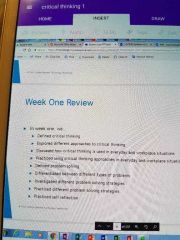
Wk 1 review |
|
|
|
Critical thinking |
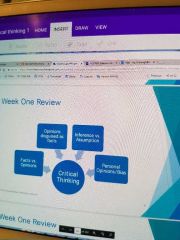
Critical thinking |
|
|
|
RED RRA |
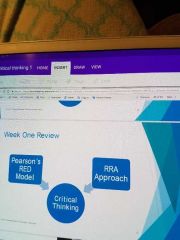
RED RRA |
|
|
|
Problem solving |
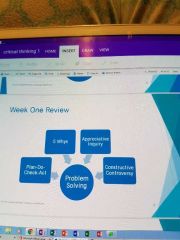
Ways to solve problems |
|
|
|
Tools of good decisions |
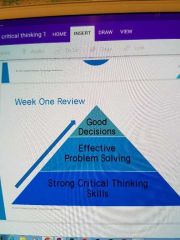
Solution pyramid |
|
|
|
OPEN ENDED PROBLEM |
has several solutions leading to several answers |
Whoever controls the answers controls the questions |
|
|
Closed or close ended problems |
Only one solution leading to 1 answer |
Whoever controls the question controls the answer |
|
|
Brainstorming wheel |
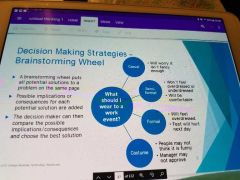
Typical wheel |
|
|
|
Comparison Analysis |
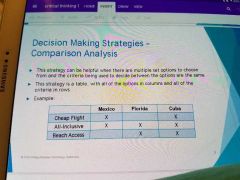
Help visualize the problem |
|
|
|
Stepladder technique |
Step by step approach Allows shy quiet members to be heard WTO others influencing them Everyone's idea is heard b4 a final decision is made Step 1 everyone hears the problem Step 2 core group of 2 to discuss problem Step 3 add a 3rd member who presents their ideas b4 hearing the core groups ideas Step 4 after all 3 members discuss ideas and sol'n discuss options together Step 5 add 4th member and so on to the group Step 6 reach a final decision only after all members have been heard and discussed |
|
|
|
Groupthink |
Practice of making decisions in a way that discourages individual responsibility or creativity |
RATIONALIZATION... Those ppl don't agree bc they haven't researched the problem like we have PEER PRESSURE... well if you feel we're not making right decision you can leave the team COMPLACENCY... Our track record is flawless... We're unstoppable MORAL HIGH GROUND... we know right and wrong and this is right STEREOTYPING... lawyers find any excuse to argue... Even when they are clearly wrong CENSORSHIP... don't listen to that nonsense they don't have a clue about what's going on ILLUSION OF UNANIMITY.. we all agree so it's decided |
|
|
How to avoid groupthink |
Explore objectives Explore alternatives Encourage ideas to be challenged WTO reprisals Examine the risks Test assumptions If necessary go back. and re examine previous alternatives that were rejected Gather relevant info from outside sources Process info objectively Have at least 1 contingency plan |
|
|
|
Why do ppl make bad decisions |
Not having sufficient alternatives Not considering all alternatives Lack of time Lack of. info Not being methodical Poor work at an earlier stage of prob solving Impulsive response |
Why do ppl and groups make poor decisions? |
|
|
Evaluating decisions |
Consider involving others when... You have formal obligation to You require additional info before making final decision Expert skills are required to evaluate options You need the commitment of others for the solution to be implemented |
It can be helpful to. Include others in the evaluation of decisions |
|
|
Ethical decisions |
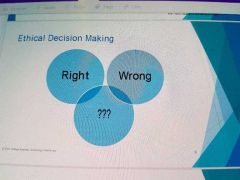
|
|
|
|
Contingency planning |
Keep the main goal in mind Identify the trigger Define time periods Identify all needs Consider related resource restrictions Define success |
Use these guidelines when creating a contingency plan |

